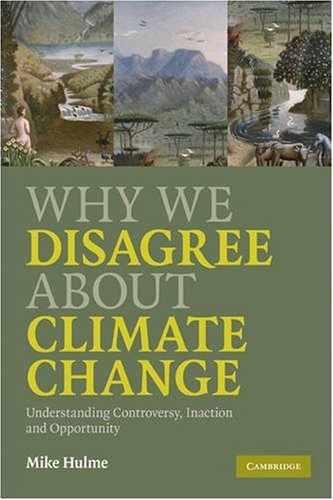If we can’t agree about Climate Change, how can we possibly address the issues in time to prevent disaster?
If we can’t agree about Climate Change, how can we possibly address the issues in time to prevent disaster?
Four decades of scientific study, unilateral government discussions and international collaboration, and here we sit with very little action to show for it. The question of why we can’t agree is therefore one of the most important questions of our age. University of East Anglia climate change professor Mike Hulme offers a valuable explanation in his recent book Why We Disagree About Climate Change. He tells us it’s in the capital letters.
Scientific data about anthropogenic climate change: temperature rise, ice melt, impacts on ocean salinity and acidity, weather patterns and species loss fall into a largely uncontested category designated with a small “c.” But Hulme tells us that the problem of human response and cooperation resides in the big “C” of Climate Change; the social interpretation of those bare, irrefutable facts.
Once we enter the social sphere we find a vast territory peopled with cultural, experiential and linguistic differences as great as those of the physical planet. Choose any cultural lens: politics, spirituality, social justice, militarism, economics, environmentalism, psychology, and then fragment it again by scale (personal, local, national, international) and by historical experience, regional practice and by vulnerability to different outcomes. All of this serves to muddy the waters of potential cooperation between different parts of the world on “big C” Climate Change.
Apparently, everything is on the table. And if there is no agreement about the goal we are targeting, it’s hardly surprising when there’s no consensus on the means to achieve it. Forget about a clear plan for getting there.
Hulme has written an important analysis that ranges confidently across far flung perspectives. He draws on personal credentials that span decades of high level involvement with the small “c” sector and with myriad constituencies of the large “C” landscape. It’s not a light read. But it is so well written and organized that it remains accessible to any reader who seriously wants to grapple with this complexity.
Ultimately, the book seems hopeful. Hulme states that the goal is not a silver bullet, but a “silver buckshot” that brings a multitude of answers to bear on a multitude of agendas. Wisely, he makes no effort to describe the possible outcome of this scatter-gun approach, but affirms faith in the concept.
Why We Disagree About Climate Change frames the issue as an opportunity for social evolution, as humanity learns to function at new levels of cooperation. His insights into the matter are complex and valuable but his insistence that Climate Change “is not a problem to be solved” but a social phenomenon, “reshaping the way we think about humanity’s place on earth,” seems frighteningly abstract. Based on humanity’s past record, it’s quite easy to doubt that our species will “get it together” fast enough to help ourselves, let alone polar bears and golden frogs.
Al Gore’s new book, Our Choice: A Plan to Solve the Climate Crisis, is a great antidote to this frustration in abstraction. Interestingly, he too frames the climate crisis as an “unparalleled opportunity” to fix some of our most intransigent global ills, but Gore’s work is practical to the core and solution focused.
At first glance the book appears almost too approachable, filled with the kind of high impact pictures and graphics most often associated with Time or Life coffee-table books. Don’t let this fool you. The visuals are not colorful lures to a lazy read. They are islands of respite on which the reader can clamber for a short break from the unstinting flow of information packed into each page.
Accepting Hulme’s thesis of silver-buckshot solutions, Our Choice provides the ammunition. Gore asserts, and comprehensively proves, “that we have at our fingertips all of the tools we need to solve the climate change crisis.” The book is a collection of practical technologies and strategies. None are predicated on the need for impossible Herculean action. Consistently, these best practices are also shown to be sound economics. Many are feasible on a local, even individual level, but the accumulated benefits are global in scope. As individuals, industries and social collectives, we possess the tools; the Climate Change crisis provides the catalyst for action.
Yet, Gore is also concerned about the question of why human kind, as a collective, has been unable to grapple with the urgency. “We have to go far, quickly,” he writes. “The only missing ingredient [to solve the climate crisis] is collective will.” Using his personal political experience and studies of social psychology, Gore adds even more layers to the complexity Hulme provided with such thoroughness.
Why We Disagree About Climate Change and Our Choice are both valuable books, but it’s Gore’s work that I will return to frequently. The book is a factual reference for state of the art technologies, offering comparative problems and costs, while also providing a positive assertion of what we can achieve with determination and ingenuity.
Why We Disagree About Climate Change, Mike Hulme, New York: Cambridge University Press, 2009, 363 pages
Our Choice: A Plan to Solve the Climate Crisis, Al Gore, New York: Rodale Press, 2009, 405 pages
Subscribe now to get more book reviews in your mailbox!
Reviewer Information
Carman Roberts is a professional artist and lifelong environmentalist living in the Guelph area. She holds a master’s degree in Environmental Geography.












